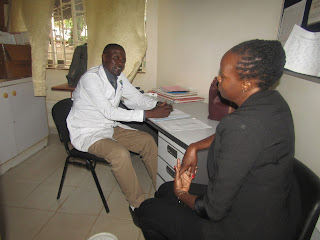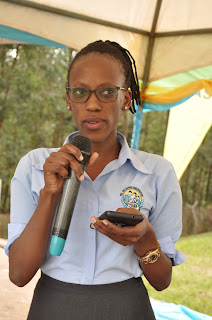"Caring for the Carer". The first Annual TASO Staff medical camp
On 31 January 2018, TASO
Mulago carried out the first medical camp for its staff at the TASO College of
Health Sciences, TASO Grants Management Unit, TASO Mulago and the TASO
Headquarters.
 This was an initiative of
the Human Resources and Administration directorate, after identifying that
staff were presenting an increasing number of requests for reimbursement or
advice on a number of treatable illnesses. Theytherefore decided to find out
what diseases affect the staff the most. Usually care is given to clients, but
under the idea of “caring for the carer”, they found that the carer in this
instant was not being taken care of inspite of the available expertise
especially in a hospital setting with services within reach. But most
importantly, this was done in line with the increase in number of identified
cases of Non Communicable disease (NCDs) sufferers the world over. Health
workers are just as susceptible to NCDs as the clients they treat.
This was an initiative of
the Human Resources and Administration directorate, after identifying that
staff were presenting an increasing number of requests for reimbursement or
advice on a number of treatable illnesses. Theytherefore decided to find out
what diseases affect the staff the most. Usually care is given to clients, but
under the idea of “caring for the carer”, they found that the carer in this
instant was not being taken care of inspite of the available expertise
especially in a hospital setting with services within reach. But most
importantly, this was done in line with the increase in number of identified
cases of Non Communicable disease (NCDs) sufferers the world over. Health
workers are just as susceptible to NCDs as the clients they treat.
There is a rise in reported cases of Non
Communicable Diseases worldwide. And now that HIV is no longer a death
sentence, NCDs seem to be taking over as “silent executioners”. There is an
increasing number of people dying from preventable
diseases. It is reported that most people do not carry out regular health
checks, nor do they seek for free medical services when available.
The camp was held in TASO
Mulago where it was more cost effective to bring experts in different fields to
come and test and treat staff on site. Since TASO does not offer all the
medical services, experts from other specialized units within Mulago hospital
were brought in to offer these services. The TASO laboratory also provided
extra services that are not available on a daily basis within the TASO
clinics.
What
was done?
The services provided
included; a general health assessment including measuring weight and height to
calculate their Body Mass Index (BMI) which is a risk factor for the NCDs. This
was done to find out whether staff were over or under weight or just right. Measuring
their blood pressure to find out those who are hypertensive or hypotensive,
checking their eyes and teeth, mental health screening, screening for H.Pilori
(ulcers) and brucellar, cervical cancer screening, blood grouping, random blood
sugar and HCG.
Treatment was done on site
for those cases that could be managed, while referral was done for those cases which
required a more conducive environment for treatment. For example, teeth
extractions were done, but no root canal was done on that day.
The
results…
A total of 60 staff members
responded to the call. And overall, it was found that staff are healthy. Out of
the 18 ladies screening for cervical cancer, only 5 were referred for a Pap
smear to the Cancer Institute. The biggest problems were with eyes and teeth. All 60 (34 male and 26 female) were screened
by the ophthalmologist and out of these 19 males and 13 females had eyesight
challenges. They were referred for further treatment. Interestingly, most of
them were not aware of these challenges. They were simply living quietly with
them. For the dental checks, they had 25 males and 35 females. Out of these
they had 6 extractions done in addition to polishing, scaling and conservation.
Root canals and teeth filling were not done because of the absence of a dental
chair, however, they were referred for further management. There was also a
session on oral hygiene.
 Staff were found to have
more Non communicable diseases than parasitic infections. Of the 60 screened in
the laboratory, only two had ulcers and one had typhoid. Emphasis was put on
the people who provide food to staff in the two different canteens. The great
news is that they were all healthy.
Staff were found to have
more Non communicable diseases than parasitic infections. Of the 60 screened in
the laboratory, only two had ulcers and one had typhoid. Emphasis was put on
the people who provide food to staff in the two different canteens. The great
news is that they were all healthy.
According to Dr. Lydia
Namwanje, the medical services supervisor, the turn up was high compared to the
time given for the camp. The feedback was positive, most people had been going
around with health challenges quietly maybe due to fear of costs for treatment
or fear of seeking for the treatment itself. Several expressed the need for
another camp with more time, maybe two days so that more services are accessed.
She suggested that maybe next year, in addition to the services this year, they
could include Ear Nose and Throat (ENT) services.
Dr. Namwanje encouraged
staff to go for regular medical checkup and not wait for only when they fall
sick. She said they are planning for a bigger and better camp next time and
hoping to target even more staff especially during a time of fewer meetings and
engagements which seem to have taken up most staff this time. Such
opportunities for free medical checkup are few and far between and in cases,
such as these, where services are brought to the work place, more staff should
respond to the need for a checkup. She
concluded by encouraging all those who have not received their Hepatitis B
vaccinations to complete them because it is for their own protection.
A
little more about NCDs.
According
to the World Health Organisation, NCDs are also referred to as chronic
diseases. They tend to be of long duration and are a result of genetic,
physiological, environmental and behavioral factors. They include
cardiovascular disease such as heart attacks and strokes, they also include
cancers, chronic respiratory diseases such as chronic obstructive pulmonary
disease and asthma. They also include diabetes.
While
they are usually associated with older age groups, statistics are fast showing
that more and more people with the workforce age bracket of 30 to 69 years are just
as vulnerable to NCDs.
On 16th February 2018, the World
Health Organisation announced the formation of a new high level
commission whose membership includes heads of state, ministers, leaders in
health and development and entrepreneurs. This group will be in charge of
proposing solutions to accelerate prevention and control of Non-Communicable
Diseases (NCDs) such as heart and lung diseases, cancers and diabetes. It was therefore quite timely for TASO
to carry out a staff medical camp and aid the process for its health workers to
champion the cause of which they are a major part of not only as carers but
also as beneficiaries of services to accelerate prevention and control of NCDs
in Uganda.
Written by: Matovu Sylvia -Communication, Policy,
Advocacy, Public Relations & Documentation Specialist- TASO Headquarters.
Photographs by: Ajamo Brenda - Public Relations Assistant -
TASO Mulago
Contributions from: Dr. Lydia Namwanje - Medical Services
Supervisor - TASO Mulago.

Comments
Post a Comment